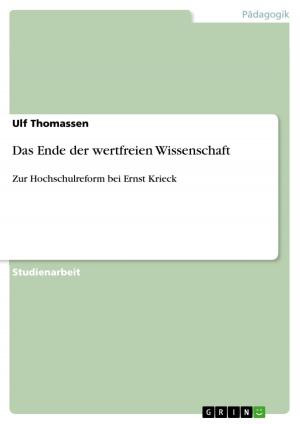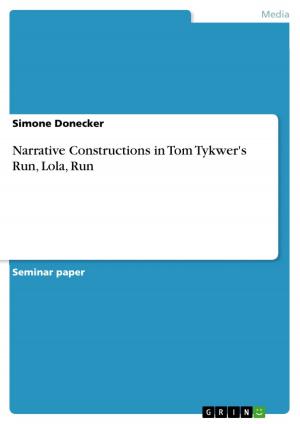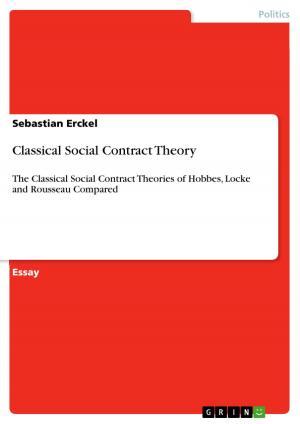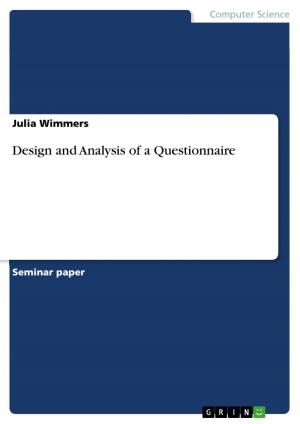To what extent do you agree that the Gesta Francorum is a simple soldier's straightforward account of the First Crusade
Nonfiction, History, European General| Author: | Michael Gärtner | ISBN: | 9783638194945 |
| Publisher: | GRIN Publishing | Publication: | June 5, 2003 |
| Imprint: | GRIN Publishing | Language: | English |
| Author: | Michael Gärtner |
| ISBN: | 9783638194945 |
| Publisher: | GRIN Publishing |
| Publication: | June 5, 2003 |
| Imprint: | GRIN Publishing |
| Language: | English |
Essay from the year 2003 in the subject History Europe - Other Countries - Middle Ages, Early Modern Age, grade: 54 %, University of Wales, Aberystwyth (Department of History), course: HIH 3124, 47 entries in the bibliography, language: English, abstract: In the eleventh century the Christian lands of Western Europe were in trouble. Afflicted by the repeated invasions from North and South and East, by the collapse of internal order, by brutal oppression of the weak, by the laxity and ignorance of the clergy, and by the unrestrained tyranny of feudal war lords, life in the West was - in the words of Thomas Hobbs - 'nasty, brutish, and short'1. The problems were compounded, when nomadic soldiers - recently converted to Islam - occupied Jerusalem and the Holy Land, thus causing the pilgrimage to them far more hazardous. But all the prayers, the sermons the condemnations and the appeals had amounted too little until in November 1095, Pope Urban II preached in Clermont. For his largely ignorant and unreflective audience, the Pope threw a harsh light of criticism on the fallings of Western society. But he pointed out, that the liberation of Jerusalem2 and the Holy Land from the 'infidels' was a redemptive task worthy of men, who could call themselves milites Christi3, the liberation of the Eastern Church, alone was 'unpopular in the West'4. At a stroke, Pope Urban intended to divert the reckless and violent men of the West into the path of righteousness. At the end of the tenth century the Church attempted to set a formal limit of customary violence.5 They could now practise warfare in a holy course. [...] 1 http://www.kaiku.com/cloisters.html (24.02.2003) 2 H. E. Mayer, The Crusades, translation by J Gillingham, (Oxford: Oxford University Press, 1972), 41-48 and Jonathan and Louise Riley-Smith, The Crusades: Idea and Reality 1095-1274, (London: Edward Arnold, 1981), 43-44. 3 K. B. Wolf, 'Crusade and narrative: Bohemond and the Gesta Francorum', Journal of Medieval History Vol. XVII, David Abulafia et al (eds.) (Amsterdam: 1991), 209. 4 Erdmann, The Origin of the Idea of Crusade, 330. 5 Under the terms of Pax Dei the Bishops tried to place certain classes of people and property beyond the reach of warring factions. At the same time, the Truga Dei took a lead from an earlier decree by Carolus Magnus and limited the time available for fighting.
Essay from the year 2003 in the subject History Europe - Other Countries - Middle Ages, Early Modern Age, grade: 54 %, University of Wales, Aberystwyth (Department of History), course: HIH 3124, 47 entries in the bibliography, language: English, abstract: In the eleventh century the Christian lands of Western Europe were in trouble. Afflicted by the repeated invasions from North and South and East, by the collapse of internal order, by brutal oppression of the weak, by the laxity and ignorance of the clergy, and by the unrestrained tyranny of feudal war lords, life in the West was - in the words of Thomas Hobbs - 'nasty, brutish, and short'1. The problems were compounded, when nomadic soldiers - recently converted to Islam - occupied Jerusalem and the Holy Land, thus causing the pilgrimage to them far more hazardous. But all the prayers, the sermons the condemnations and the appeals had amounted too little until in November 1095, Pope Urban II preached in Clermont. For his largely ignorant and unreflective audience, the Pope threw a harsh light of criticism on the fallings of Western society. But he pointed out, that the liberation of Jerusalem2 and the Holy Land from the 'infidels' was a redemptive task worthy of men, who could call themselves milites Christi3, the liberation of the Eastern Church, alone was 'unpopular in the West'4. At a stroke, Pope Urban intended to divert the reckless and violent men of the West into the path of righteousness. At the end of the tenth century the Church attempted to set a formal limit of customary violence.5 They could now practise warfare in a holy course. [...] 1 http://www.kaiku.com/cloisters.html (24.02.2003) 2 H. E. Mayer, The Crusades, translation by J Gillingham, (Oxford: Oxford University Press, 1972), 41-48 and Jonathan and Louise Riley-Smith, The Crusades: Idea and Reality 1095-1274, (London: Edward Arnold, 1981), 43-44. 3 K. B. Wolf, 'Crusade and narrative: Bohemond and the Gesta Francorum', Journal of Medieval History Vol. XVII, David Abulafia et al (eds.) (Amsterdam: 1991), 209. 4 Erdmann, The Origin of the Idea of Crusade, 330. 5 Under the terms of Pax Dei the Bishops tried to place certain classes of people and property beyond the reach of warring factions. At the same time, the Truga Dei took a lead from an earlier decree by Carolus Magnus and limited the time available for fighting.















